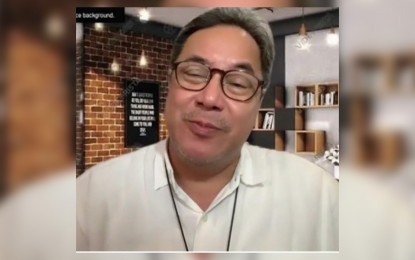
Dr. Ted Herbosa, former executive vice president of the University of the Philippines System (PNA File photo)
MANILA – For former executive vice president of the University of the Philippines (UP) System, Dr. Ted Herbosa, House Bill 10171 institutionalizing the 1989 UP-Department of National Defense (DND) Accord does not protect academic freedom.
Herbosa said UP's academic freedom is already guaranteed by Republic Act 9500 also known as "The University of the Philippines Charter of 2008".
"Actually, it (academic freedom) is already incorporated in the UP Charter. So may batas na nagpapalawig nitong academic freedom (So there is already a law calling for the strengthening of academic freedom)," Herbosa said during Monday's episode of "Tagged! Debunking Lies by Telling the Truth".
House Bill 10171 does not ensure academic freedom protects the lawless elements present in any of the UP campuses.
"Ano ang sini-secure niya? Ang sini-secure niya ay iyong masasamang tao sa loob ng isang campus (What is it securing? It is securing the lawless elements present in a campus)," said Herbosa, who is also a special adviser to the National Task Force Against Covid-19.
He added that academic freedom is vested in the institution and not the people in it.
"Ang may academic freedom ay ang institusyon. So lahat ng unibersidad, lahat ng institutions of higher education na under sa Pilipinas ay may academic freedom po. Lahat sila ay layag na madiskusyon ang rebolusyon, ang mga iba’t ibang kaisipan, communism, socialism, capitalism, democracy, federalism – puwede nilang i-discuss iyan in the setting of a classroom (Institutions have academic freedom. All universities, all institutions of higher learning in the Philippines have academic freedom. They all have the right or freedom to discuss different thoughts like communism, socialism, capitalism, federalism, they can discuss that in the classroom setting)," he added.
A bill institutionalizing the 1989 UP-DND Accord into the UP Charter on Sept. 21 hurdled third reading approval at the House of Representatives.
House Bill 10171, which seeks to amend Section 11 of Republic Act 9500, was passed with 179 affirmative votes.
It also seeks to prevent state security forces, such as the Philippine National Police (PNP) and Armed Forces of the Philippines (AFP), from entering and enforcing its operations in all UP campuses without prior notice to “the President or the Chancellor of the constituent university or the dean of the regional unit concerned” except “in cases of hot pursuit and similar occasions or emergencies.”
It mandates university officials, whenever requested by law enforcers, to extend the necessary assistance in law enforcement within the premises of the UP campuses.
Herbosa said many of the congressmen voted for the House bill as they are not really aware of the real meaning of academic freedom.
As former executive vice president of the UP System, Herbosa said he is aware of other things than communist recruitment going on the campuses.
"Pero ang naging problema natin ay dahil mayroong (UP-DND Accord), alam ninyo bang dumami doon sa mga residential area ng UP Diliman ang sugal, ang drugs. Mayroon diyang illegal na sabungan, hindi po nahihinto iyan; mayroon diyang pumapasok na nagpu-push ng drugs, ng iligal na droga – hindi rin nahihinto iyan (But our problem when the (UP-DND Accord) was still existing, incidents of illegal gamblings, illegal drugs climbed in the residential areas of UP Diliman. There was also illegal cockfighting, it was not halted, there were also instances of pushers entering and selling illegal drugs, these were not stopped)," he added.
These are the bad effects of the UP-DND Accord and Herbosa said he is in agreement with Defense Secretary Delfin Lorenzana who called for its abrogation last year, 32 years after it was signed on January 30, 1989.
It was effectively terminated effective Jan. 21 with the defense chief calling the arrangement "obsolete".
Lorenzana said the agreement was used by the Communist Party of the Philippines - New People’s Army (CPP-NPA) to turn UP into a breeding ground of "intransigent individuals and groups whose extremist beliefs have inveigled students to join their ranks to fight against the government."
The CPP-NPA is listed as a terrorist organization by the United States, the European Union, the United Kingdom, Australia, Canada, New Zealand, and the Philippines. (PNA)
